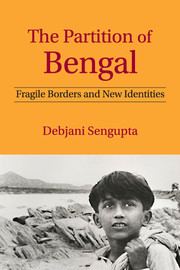Book contents
- Frontmatter
- Dedication
- Contents
- Acknowledgements
- Introduction
- 1 The Calcutta Riots in Representations and Testimonies
- 2 Noakhali and After: History, Memory and Representations
- 3 Colony Fiction: Displacement and Belonging in Post-Partition Bangla Fiction
- 4 From Dandakaranya to Marichjhapi: Refugee Rehabilitation in Bangla Partition Fictions
- 5 The Partition's Afterlife: Nation and Narration from the Northeast of India and Bangladesh
- 6 Uncanny Landscapes and Unstable Borders: Politics and Identity in Geo-Narratives of the Partition (2005–10)
- Bibliography
- Index
2 - Noakhali and After: History, Memory and Representations
Published online by Cambridge University Press: 18 December 2015
- Frontmatter
- Dedication
- Contents
- Acknowledgements
- Introduction
- 1 The Calcutta Riots in Representations and Testimonies
- 2 Noakhali and After: History, Memory and Representations
- 3 Colony Fiction: Displacement and Belonging in Post-Partition Bangla Fiction
- 4 From Dandakaranya to Marichjhapi: Refugee Rehabilitation in Bangla Partition Fictions
- 5 The Partition's Afterlife: Nation and Narration from the Northeast of India and Bangladesh
- 6 Uncanny Landscapes and Unstable Borders: Politics and Identity in Geo-Narratives of the Partition (2005–10)
- Bibliography
- Index
Summary
Only the poisoned tree will bear fruit, till generations last.
Noakhali survivorMemory and History have a long but ambiguous relationship. History reduces memory to a status of a source, a means to civilized existence. Materialized, externalized and archived, living memory is not valued as an art to a civilized existence…It is assumed that history begins where memory ends…However today…the relationship between memory and history appears to have taken a dramatic turn in the reversal of fortune. When history ceases to be an art of memory it loses its meaning and purpose, though reconciled with memory history can draw on the wellspring of imagination, discover ‘lost worlds’ by a reconnection with the memories of groups excluded from the consciousness of historians.
Then perhaps we will realize that memory begins where history ends.
Literature and history serve the same God and have a close interdependence on each other in that they both ‘narrate’ events. The empiricist and the constructionist theories of history have come under challenge and there is now an increased recognition that history's invented, discursive narratives have a close relationship with the figurative codes of literature as both depend on language and narrative forms. Both are, in particular ways, creations of the human imagination, although with differing objectives. Nowhere is this closeness revealed more than in the historically embedded women's autobiographical mode of writing where the author is both a narrator and a witness to her times. A memoir or an autobiography then becomes a valuable form of historical testimony especially as it intertwines personal experiences with political and cultural contexts and underlines the autonomous struggles by women for themselves and for others. Although an autobiography depicts a world of interiority, it is also a self-reflexive appraisal of the past and a testimonial to the subject's self-fashioning. In many cases, an autobiographical narration centred within a historical ‘event’ can come into play with certain aspects of memory to configure such an event as a ‘myth’ just as it may see its own relationship to that event as creating, in turn, the self. A myth, independent of space and time, can carry traces of the teleological crack between event and meaning and allow one to interpret certain facets of the past not as a search for authenticity but as a way to read it in a more complex way.
- Type
- Chapter
- Information
- The Partition of BengalFragile Borders and New Identities, pp. 68 - 116Publisher: Cambridge University PressPrint publication year: 2015



